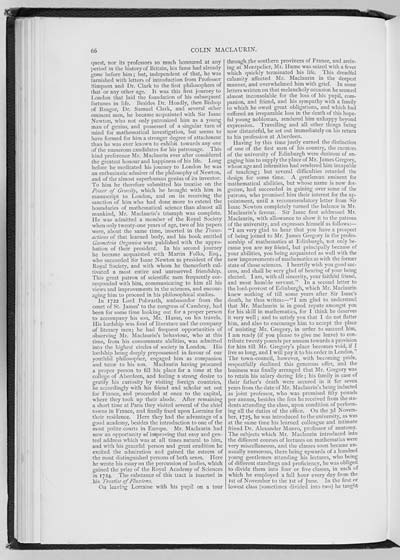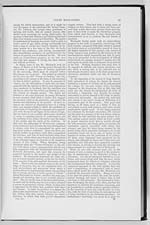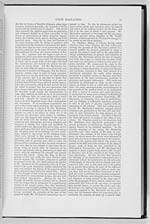66
quest, nor its professors so much honoured at any
period in the history of Britain, his fame had already
gone before him; but, independent of that, he was
furnished with letters of introduction from Professor
Simpson and Dr. Clark to the first philosophers of
that or any other age. It was this first journey to
London that laid the foundation of his subsequent
fortunes in life. Besides Dr. Hoadly, then Bishop
of Bangor, Dr. Samuel Clark, and several other
eminent men, he became acquainted with Sir Isaac
Newton, who not only patronized him as a young
man of genius, and possessed of a singular turn of
mind for mathematical investigation, but seems to
have formed for him a stronger degree of attachment
than he was ever known to exhibit towards any one
of the numerous candidates for his patronage. This
kind preference Mr. Maclaurin ever after considered
the greatest honour and happiness of his life. Long
before he meditated his journey to London he was
an enthusiastic admirer of the philosophy of Newton,
and of the almost superhuman genius of its inventor.
To him he therefore submitted his treatise on the
Power of Gravity, which he brought with him in
manuscript to London, and on its receiving the
sanction of him who had done more to extend the
boundaries of mathematical science than almost all
mankind, Mr. Maclaurin's triumph was complete.
He was admitted a member of the Royal Society
when only twenty-one years of age, two of his papers
were, about the same time, inserted in the Trans-
actions of that learned body, and his book entitled
Geometria Organica was published with the appro-
bation of their president. In his second journey
he became acquainted with Martin Folks, Esq.,
who succeeded Sir Isaac Newton as president of the
Royal Society, and with whom he thenceforth cul-
tivated a most entire and unreserved friendship.
This great patron of scientific men frequently cor-
responded with him, communicating to him all his
views and improvements in the sciences, and encour-
aging him to proceed in his philosophical studies.
In 1722 Lord Polwarth, ambassador from the
court of St. James' to the congress of Cambray, had
been for some time looking out for a proper person
to accompany his son, Mr. Hume, on his travels.
His lordship was fond of literature and the company
of literary men; he had frequent opportunities of
observing Mr. Maclaurin's behaviour, who at this
time, from his consummate abilities, was admitted
into the highest circles of society in London. His
lordship being deeply prepossessed in favour of our
youthful philosopher, engaged him as companion
and tutor to his son. Maclaurin having procured
a proper person to fill his place for a time at the
college of Aberdeen, and feeling a strong desire to
gratify his curiosity by visiting foreign countries,
he accordingly with his friend and scholar set out
for France, and proceeded at once to the capital,
where they took up their abode, After remaining
a short time at Paris they visited several of the chief
towns in France, and finally fixed upon Lorraine for
their residence. Here they had the advantage of a
good academy, besides the introduction to one of the
most polite courts in Europe. Mr. Maclaurin had
now an opportunity of improving that easy and gen-
teel address which was at all times natural to him,
and with his graceful person and great erudition he
excited the admiration and gained the esteem of
the most distinguished persons of both sexes. Here
he wrote his essay on the percussion of bodies, which
gained the prize of the Royal Academy of Sciences
in 1724. The substance of this tract is inserted in
his Treatise of Fluxions,
On leaving Lorraine with his pupil on a tour
through the southern provinces of France, and arriv-
ing at Montpelier, Mr. Hume was seized with a fever
which quickly terminated his life. This dreadful
calamity affected Mr. Maclaurin in the deepest
manner, and overwhelmed him with grief. In some
letters written on that melancholy occasion he seemed
almost inconsolable for the loss of his pupil, com-
panion, and friend, and his sympathy with a family
to which he owed great obligations, and which had
suffered an irreparable loss in the death of this hope-
ful young nobleman, rendered him unhappy beyond
expression. Travelling and all other things being
now distasteful, he set out immediately on his return
to his profession at Aberdeen.
Having by this time justly earned the distinction
of one of the first men of his country, the curators
of the university of Edinburgh were desirous of en-
gaging him to supply the place of Mr. James Gregory,
whose age and infirmities had rendered him incapable
of teaching; but several difficulties retarded the
design for some time. A gentleman eminent for
mathematical abilities, but whose name is now for-
gotten, had succeeded in gaining over some of the
patrons, who promised him their interest for the ap-
pointment, until a recommendatory letter from Sir
Isaac Newton completely turned the balance in Mr.
Maclaurin's favour. Sir Isaac first addressed Mr.
Maclaurin, with allowance to show it to the patrons
of the university, and expresses himself as follows:�
"I am very glad to hear that you have a prospect
of being joined to Mr. James Gregory in the profes-
sorship of mathematics at Edinburgh, not only be-
cause you are my friend, but principally because of
your abilities, you being acquainted as well with the
new improvements of mathematics as with the former
state of those sciences. I heartily wish you good suc-
cess, and shall be very glad of hearing of your being
elected. I am, with all sincerity, your faithful friend,
and most humble servant." In a second letter to
the lord-provost of Edinburgh, which Mr. Maclaurin
knew nothing of till some years after Sir Isaac's
death, he thus writes:�"I am glad to understand
that Mr. Maclaurin is in good repute amongst you
for his skill in mathematics, for I think he deserves
it very well; and to satisfy you that I do not flatter
him, and also to encourage him to accept the place
of assisting Mr. Gregory, in order to succeed him,
I am ready (if you please to give me leave) to con-
tribute twenty pounds per annum towards a provision
for him till Mr. Gregory's place becomes void, if I
live so long, and I will pay it to his order in London."
The town-council, however, with becoming pride,
respectfully declined this generous offer, and the
business was finally arranged that Mr. Gregory was
to retain his salary during life; his family in case of
their father's death were secured in it for seven
years from the date of Mr. Maclaurin's being inducted
as joint professor, who was promised fifty pounds
per annum, besides the fees he received from the stu-
dents attending the class, upon condition of perform-
ing all the duties of the office. On the 3d Novem-
ber, 1725, he was introduced to the university, as was
at the same time his learned colleague and intimate
friend Dr. Alexander Monro, professor of anatomy.
The subjects which Mr. Maclaurin introduced into
the different courses of lectures on mathematics were
very miscellaneous, and the classes soon became un-
usually numerous, there being upwards of a hundred
young gentlemen attending his lectures, who being
of different standings and proficiency, he was obliged
to divide them into four or five classes, in each of
which he employed a full hour every day from the
1st of November to the 1st of June. In the first or
lowest class (sometimes divided into two) he taught

![]() Universal Viewer |
Universal Viewer | ![]() Mirador |
Large image | Transcription
Mirador |
Large image | Transcription
![]()

